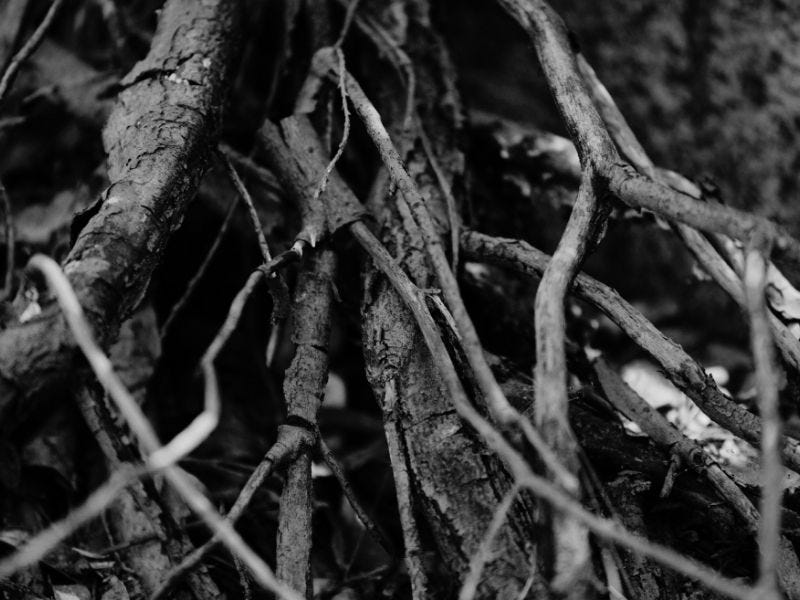The Call is Coming from Inside the House
Purity Culture & Colonialism
When I was in the throes of my own religious deconstruction—the pulling apart and reexamining of my Christian beliefs, there were so few places to turn where I felt seen. I made do with some resources that felt a bit like a bridge, but nothing felt like an arrival. As a queer, agender, 1.5 generation Asian immigrant, the intersectionality of my identities was instrumental in both the pain and loneliness of my deconstruction process, and also in the beauty and freedom that came with uncovering parts of myself I had considered long lost. For people who have multiple intersections of identity, especially identities that have been historically and systemically excluded, navigating religious trauma can become exponentially more complicated. If you are a queer or trans person who is also Black, Indigenous, or a Person of Color (BIPOC) and you attend a culturally specific church, your church might is the only place where you regularly hear your mother tongue spoken. If you are a BIPOC person living in a largely white area, your Christian family may be one of the only places you get to encounter faces that reflect your own. If your non-queer affirming Christian community brings comfort in many ways, while also inflicting harm in equal measure, this can be a fundamentally destabilizing experience. This is a familiar dance for so many folks who hold intersecting identities, and navigating deconstruction while holding and honoring multiple identities brings an additional layer of nuance and complication.
The ways that I personally navigated this process are by no means the only ways forward. In fact, there are many paths that can guide us through to where we need to go. However, as a queer Asian person going through deconstruction, I remember that the loneliness of not seeing my own experience reflected cut me through to my core during my most wrenching moments. Much of the writing about deconstruction is currently the perspective of white, straight, and cisgender dominant culture. I remember struggling to piece together how to deconstruct my faith in a way that felt navigable, because whenever I unraveled one part of my faith, it would pull on a thread that unraveled seven others. For me, a huge part of this process was navigating the way that purity culture touched every part of my life—my relationships to work, hobbies, social justice, my communities, and ultimately my relationship to myself even in realms that felt far removed from sexuality. Some 18 years on from unraveling the very first thread, some things are clear to me that I could not have named at the time. For instance, the way in which purity culture and Christian colonialism are deeply intertwined in the way that they both seek to control our relationships to ourselves, to others, and to systems. Christian colonialism has extended its arms into the ancestries of virtually all BIPOC people on earth, and uses faith as justification for genocide, slavery, and exploitation of resources. Colonialism seeks to subjugate and control not just physical, but also relational and psychological worlds through multiple generations. For those who are exploited, one way to cope with this is through internalized oppression—adopting the colonizer’s worldview as superior. And in doing this, it is impossible not to leave core parts of yourself behind. Internalized oppression has been a big part of my, and so many others’ journeys of deconstruction.
Yet, it’s only once we name these happenings, and come to terms with how they’re affecting our lives, that we can move through and away from them. Through this frame, it follows that purity culture, which seeks to control the way we are in relationship to our own bodies, has deep roots in patriarchy, white supremacy, and even capitalism—all fruit of the tree of colonialism. Purity culture calls us to be ashamed of having bodies, and of all the normal functions that come with having a body. It tells us to hold our natural yearnings and desires suspect, and to discard them because they are sinful. For queer and trans folks, it calls us to be ashamed of our sexual and gender identities if we do not conform to dominant cisgender and heteronormative standards. For BIPOC folks, it calls us to conform to white, Eurocentric standards as the benchmark. Systems of power have a stake in us continuing to hate ourselves. In this way, the act of loving ourselves is in and of itself an act of resistance.
Ultimately, for those who embody multiple intersections of historically excluded identities, the feelings of grief and loss that accompany this journey cannot be understated. This process has no easy way through, and being on the deconstruction journey can be a conduit for these feelings. Emergence and blooming of parts of ourselves that have been previously unseen is a beautiful and powerful pilgrimage. But the journey of getting there can mean the loss of treasured communities that already feel scarce. Sometimes ashes are a prerequisite for the forging of new life from fire, but the pain inherent in this is vast. If this is you—your experiences are valid, you are valid. Don’t walk through this process alone, if you can help it. And finally, remember that there exists a powerful lineage of many others who have traveled these steps before you, and they see you too.
.


